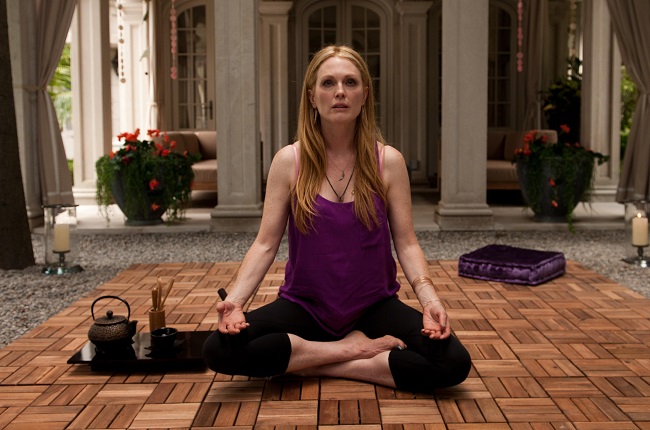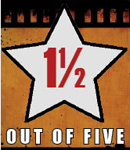

There's just no nice way of putting this, so I'm going to just say it: Maps to the Stars is a bad film. It would be a bad film coming for almost any filmmaker, so the fact that it comes from David Cronenberg makes matters that much more depressing. Let's back up a bit though …
After thrilling, shocking and disgusting entire generations with his early works, David Cronenberg took a hard right with his career in the early 1990s. He moved away from the body horror, the gore and the various fluids that viscerally entertained his fans for the first two decades of his career and began to focus more on the psychological side of his thematic obsessions. Bodily metamorphosis gave way to mental metamorphosis, but the core ideas, themes, and obsessions that permeate David's career remained intact.
Viggo Mortensen's Tom Stall might not have been birthed from some slimy sack, but he was born of former mobster Joey Cusack's desire to make something different of himself in A History of Violence. Such duality and exploration of psychological (and physical) desires are also found all over the likes of Eastern Promises, M. Butterfly and A Dangerous Method. Occasionally, a bit of "body horror" might creep its way in (i.e. Crash, eXistenZ), but by and large those old toys have remained up in the mental attic where David left them. This has frustrated many a fan and devotee of his work over the years, but how can one fault a man so obsessed with transformation for evolving into something different with each new stage of his career?
I have no quarrel with David over him leaving the horror genre behind. After all, it's been decades since he gave us a new entry in my favorite genre and he's still made some of his best work since. Before I sat down with Maps to the Stars, I decided to take a short journey through some of his more recent works again. Nothing made before A History of Violence was given a spin and I finally managed to catch up with both A Dangerous Method and Cosmopolis. I rather enjoyed Method, despite it not being one of his better works. Cosmopolis proved to be a bit of a chore, however. While it ultimately just wasn't my kind of film, I could at least appreciate what he was going for with it and the craft involved in presenting what was ultimately a rather stilted tale. I certainly don't seem to be alone in my disliking of the film, but I don't begrudge those who find something worthwhile within it. Which brings me up to date with the man's latest …
Maps to the Stars has all of the same problems as Cosmopolis, but with none of the style and grace. If Cosmopolis worked for you, it is entirely possible that this one might as well. If it didn't, I have some bad news for you: this one is far worse. The meandering plot, supposedly meant as a satire of Hollywood today, plays out mostly like every other bland dark indie drama dumped onto VOD and a scant theatrical release these days (which is exactly what has happened here). To make matters worse, it just isn't funny. If Cronenberg hadn't been calling it a satire years before he actually made it, I never would have known it was supposed to be one.
The characters are pretty much all terrible people, which is perfectly fine. I have no problem watching a film packed with unsympathetic characters. I just wish they did more than stand around and explain who they are to each other in almost every scene of the film. In many cases, they do it more than once to the same person! Even as recently as Promises (and to a lesser degree, Method), Cronenberg's work contains numerous instances of dialogue free moments where his characters were able to get across who they were just in glances and body language.
David has always been pretty good at drawing a maximum amount of character out of the smallest, quietest moments. That sadly isn't the case here. Beyond a rather great turn by Julianne Moore as what can only be described as a window into Linsday Lohan's future a decade from now, everyone else in the cast seems lost. Robert Pattinson, Olivia Williams and Mia Wasikowska all seem to be trying their best with what little they are given to work with, but it just isn't enough. And the less said about John Cusack (who replaced a bounced-during-prep Viggo), the better.
The film itself bears the same washed-out DTV look as every other generic indie drama that is chucked out on Netflix Instant week in and out. I was as bored with its bland look as the actors themselves seemed to be with their roles. Looking back on the film a few days after seeing it, I have to wonder if this script had been laying around for so long that David just felt compelled to make it to get it out of the way and have something to do when other projects fell through. I'm honestly not sure which thought is more soul-crushing: that Cronenberg was just going through the motions and making this because the money was there or that he was actually passionate about this project and it still turned out this terrible? For what might be the first time in his career, David touches on many of his favorite themes and has absolutely nothing to actually say about any of them.
All week long I have witnessed numerous friends and colleagues discussing and celebrating the man's works (both old and new). It's all seemingly been spurred by the pending release of this, his latest film, and it has been a wonderful thing to witness and participate it. I just wish Maps to the Stars itself was worthy of even an iota of such attention rather than being Cronenberg's worst film to date.











